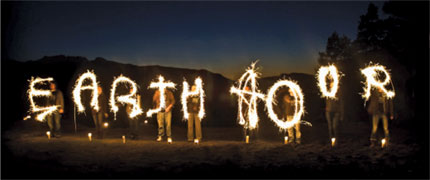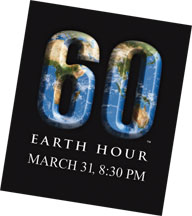Dare the world to save the planet
By Pramod DE SILVA
Can we spare just one hour, just once a year, for our Planet Earth?
That is a question we dare to ask, because not many think about the
Earth and our impact on it. Can we dare the world to save the planet? We
should, because the Earth is now going through a very difficult phase
due to climate change and a myriad other man-made factors. Any positive
steps that we take right now could save it for the future generations.
  ‘Dare the World to Save the Planet’ is the theme of this year’s Earth
Hour from 8.30 pm to 9.30 pm on March 31. In the simplest terms, Earth
Hour is a period during which we are called upon to switch off lights
(and may be other appliances) to highlight our commitment to save the
Earth. ‘Dare the World to Save the Planet’ is the theme of this year’s Earth
Hour from 8.30 pm to 9.30 pm on March 31. In the simplest terms, Earth
Hour is a period during which we are called upon to switch off lights
(and may be other appliances) to highlight our commitment to save the
Earth.
Wherever in the world you are, according to your time zone, you can
participate in this noble exercise from 8.30 pm. Considering that it is
being done all over the world (in around 140 countries), the impact will
be enormous.
And this year, there is a clarion call from the World Wildlife Fund
(WWF) to do more than switch off your lights. “We want you to dare the
world to save the planet. ‘I Will If You Will’ is a simple promise and a
challenge.
Dare anyone (your Facebook friends, co-workers, celebrities) to
accept your challenge and help protect the Earth or accept the challenge
of someone else. It is an invitation to save the world”. You can catch
all the action on the WWF’s YouTube digital platform
www.youtube.com/earthhour.
To give three examples, Earth Hour Kids’ ambassador Pocoyo will plant
50,000 trees if 100,000 people play his recycling game on EarthHour.org.
The President of Fiji, 70-year-old Epeli Nailatikau will walk 30
kilometres to raise awareness of climate issues if businesses,
non-government organisations and government departments in his country
take clear-cut actions that will benefit the environment.
International supermodel Miranda Kerr has promised to give a free
Internet-based yoga class if 500 of her fans uploaded their own 'I Will
If You Will' challenge to YouTube. You too can issue a similar challenge
to people around you and be a part of Earth Hour apart from switching
off the lights.
The Earth Hour City Challenge is another new WWF initiative that
encourages cities to prepare for the costly impacts of climate-related
extreme weather and reduce their carbon footprint. The public unveiling
of this initiative will take place at an event on March 31 in Tucson,
Arizona just before Earth Hour 2012.
Environmental celebration
WWF is hoping to make this year’s Earth Hour the “largest
environmental celebration in human history” with the help of digital
media and social media such as Facebook and Twitter. According to Earth
Hour founder and Executive Director Andy Ridley, last year’s event
reached 1.8 billion people across the globe, nearly one-fourth of
humanity. This year’s reach could be even greater.
  Earth Hour 2012 is even more special for one more reason. It will
extend to outer space for the first time. WWF says the one-hour
switch-off will reach the International Space Station (ISS). Earth Hour
astronaut-ambassador Andre Kuipers will be at the ISS to watch over the
planet as lights switch off on March 31. It is likely to be a
spectacular sight. Earth Hour 2012 is even more special for one more reason. It will
extend to outer space for the first time. WWF says the one-hour
switch-off will reach the International Space Station (ISS). Earth Hour
astronaut-ambassador Andre Kuipers will be at the ISS to watch over the
planet as lights switch off on March 31. It is likely to be a
spectacular sight.
“Any movement of change begins with symbolism - it’s a needed step to
prove enough people care about an issue. Earth Hour is past the
beginning now, and lots of people are switching off their lights every
year in March. We’re now at the stage of taking it beyond the hour,”
says Ridley.
Various countries will be hosting Earth Hour switch-off ceremonies.
The official Earth Hour ceremony will be held in the Philippines, which
has topped global town and city participation levels for three straight
years. Switch-off ceremonies will be held in Makati, Cebu and Davao.
Around the world, nearly 5,500 cities and towns will go dark. But you
can participate in other simple ways too – such as walking to the
junction instead of taking the car.
Here in Sri Lanka, the Earth Hour program coincides with a call by
the Power and Energy Ministry to switch off at least one light bulb or
appliance in each household from 6.30 pm to 9.30 pm.(The peak hours for
power consumption) to save power due to exigencies experienced in power
generation.
It also has an environmental factor, because there will be reduced
demand on the thermal generators which consumer fossil fuels emitting
greenhouse gases. Either way, it is a small measure that helps save the
Earth. Thus the two programs match perfectly in aim and scope.
Fossil fuels
It takes a large quantity of energy to power a huge city. In most
cases, fossil fuels including coal are burnt to provide power. Nuclear
energy and hydro power are also used, but to a lesser extent.
Even in Sri Lanka, hydro power currently supplies only around 14
percent of the power requirement. Other environmental-friendly
alternatives such as solar and wind power contribute only a little to
the overall power grid though efforts are under way to increase their
share.
 The bottom line is that fossils fuels are still the major source of
power for much of the world. Even after employing emission reduction
technologies, a considerable quantity of greenhouse gases are released
to the atmosphere in this process. However, if a major city turns its
lights off, the savings (in terms of fuel and emissions) are very
significant. The bottom line is that fossils fuels are still the major source of
power for much of the world. Even after employing emission reduction
technologies, a considerable quantity of greenhouse gases are released
to the atmosphere in this process. However, if a major city turns its
lights off, the savings (in terms of fuel and emissions) are very
significant.
For example, Earth Hour 2011 in Dubai saved 204,000 kWh electricity
and 122,000kg of carbon emissions through the participation of
individuals, businesses, government departments and educational
institutions. Multiply these figures by 5,000 (the minimum number of
cities and towns observing Earth Hour) and you can get a clear idea of
the immense effect on the environment and fossil fuel resources.
Earth Hour is a very simple concept with a timely message. It does
not take any effort to switch off an unnecessary light bulb or
appliance, but the effect on the future is tangible. However, we need
not restrict ourselves to just one hour. Saving power should become a
habit.
Always turn off unnecessary lights and appliances, use
environmental-friendly transport modes whenever possible and engage in
other acts that reduce our carbon footprint. Individual contributions of
this nature can make a huge difference in the end. Our Earth needs more
than an hour to heal, but it is a good start.
|

